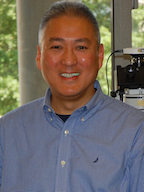Biography
James Koh, Ph.D., is an Associate Professor of Surgery at UCSF and Director of the newly established Endocrine Neoplasia Research Lab. He earned his doctorate under the direction of Dr. Francis S. Collins at the University of Michigan, Ann Arbor, and then completed a post-doctoral fellowship in Dr. Ed Harlow's laboratory at Harvard University. Dr. Koh joined the UCSF faculty in December 2018.
Building upon his background in cellular signaling, cell cycle regulation, and tumor suppressor function, Dr. Koh's laboratory has developed a combination of molecular, murine modeling, and live-cell imaging approaches to examine the underlying mechanisms of disrupted biochemical signaling behavior in human endocrine tumors.
Recently, Dr. Koh and his research team utilized live tumor tissue functional analysis of calcium responsiveness to reveal two discrete classes of human parathyroid adenomas associated with differing patterns of clinical presentation and outcome. Towards the goal of establishing a novel dynamic functional axis of diagnostic criteria to supplement conventional tumor classification metrics, Dr. Koh will focus on the development of live-cell imaging methods for direct ex vivo provocative testing of endocrine tumor reactivity to physiological agonist engagement at single cell resolution.
Research Overview
The Endocrine Neoplasia Research Lab employs a combination of molecular, murine modeling, and live-cell imaging approaches to examine the underlying mechanisms of disrupted biochemical sensing behaviors in human endocrine tumors. Recently, in contrast to the prevailing clonal origin model, our group has shown that parathyroid adenomas driving primary hyperparathyroidism are comprised of functionally discrete and separable cellular subpopulations that respond differentially to extracellular calcium stimulation and which arise in many cases following polyclonal expansion of multiple independent progenitor cells within the parathyroid gland.
We are employing dynamic calcium response imaging at both the single cell and intact tissue level, in combination with transgenic mouse modeling to study how these newly identified cellular subpopulations drive the failure of appropriate calcium sensing in parathyroid disease. To examine cell-signaling behaviors in the native context of viable tumor tissue, we have developed a novel ex vivo imaging system that enables direct provocative testing of tumor reactivity to physiological agonist engagement at single-cell resolution. These methods form the foundation for our laboratory's ongoing efforts to understand how perturbed biochemical signaling can contribute to the development of preneoplastic lesions in human endocrine neoplasia.

